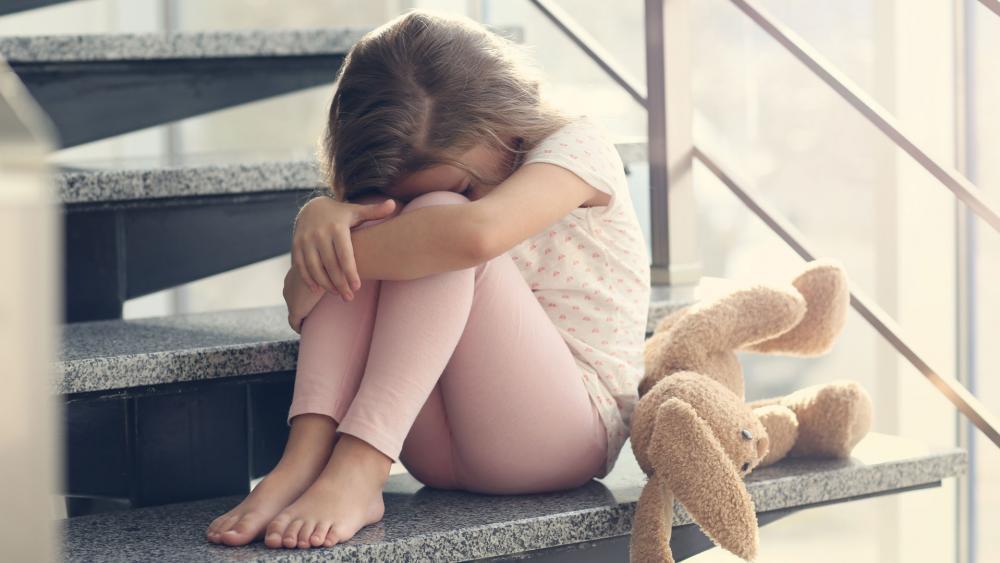Already horrific childhood mental health stats were made significantly worse during the COVID-19 pandemic. While the predominant focus during the pandemic has been and still remains physical health, the mental health of America's youth has recently deteriorated to never before seen levels of concern.
Several leading pediatric health organizations declared children's mental health a national emergency. The American Academy of Pediatrics, the American Academy of Child and Adolescent Psychiatry, and the Children's Hospital Association issued a joint declaration highlighting the steep rise in mental health challenges among America's youth, urging America's policymakers to increase access to mental health resources for children regardless of the parent's ability to pay.
Emergency Room Visits Up Sharply
Even before the pandemic, the number of children committing suicide had been growing steadily for a decade. In 2018, for example, suicide became the second leading cause of death for kids over age 10. The pandemic took it to a whole new level.
Centers for Disease Control and Prevention researchers found between March and October 2020, emergency department visits for mental health emergencies rose by 24% for children ages 5-11 years and 31% for children ages 12-17 years. In addition, emergency hospital visits for suspected suicide attempts increased nearly 51% among girls ages 12-17 years in early 2021 compared to the same period in 2019.
Christian psychiatrist Daniel Amen treats young people and told CBN News his Amen psychiatric clinics across the country are seeing a disturbing increase in young people with mental health problems.
"It's really quite horrifying when you think about it," he said.
He said he's never seen kids in more distress in his more than 40 years of practicing psychiatry.
"Anxiety and depression were at epidemic levels before the pandemic," he said. "Then if you add on top of that fear, loss, social isolation. What we saw was anxiety and depression double over the last 20 months."
While returning to school helps alleviate some root causes of mental health problems among young people, other issues that often lead to emotional distress persist.
Parents Can Help
Dr. Amen says social media influence can diminish a young person's outlook on life.
"The more time a child spends on social media the worse they feel about themselves," he said. "There's a higher incidence of anxiety, depression, (poor) body image. So I think parents have to be careful and supervise the amount of time kids spend on these social media apps."
In his book, Your Brain Is Always Listening: Tame the Hidden Dragons that Control Your Happiness, Habits, and Hang-Ups, Dr. Amen describes scientifically proven techniques to calm anxiety and boost mood.
"Start every day with, 'Today is going to be a great day,' and that way our mind will find, 'Well what am I looking forward to today?' We end every day with, 'What went well today?', writing down the things we're grateful for," he explained.
Dr. Amen says part of the reason behind this phenomenon in kids is that adult depression tripled during the pandemic, which impacted children.
"Children are like violins in that they play the stress of their parents," he said. "If parents did really well during the pandemic, their kids tended to do better. Parents are modeling health or they're modeling illness."
Physical Solutions to a Mental Challenge
Sometimes physical changes in areas such as exercise, diet, and sleep can lessen emotional problems, or in some cases, eliminate them.
Psychiatrist James Greenblatt, author of Integrative Medicine for Depression: The Breakthrough Natural Treatment Plan That Defeats Depression, told CBN News too many depressed children and teens aren't eating right, including kids who are overweight.
"They are also profoundly deficient in certain nutrients," he said.
Dr. Greenblatt says two of the primary contributors are low levels of vitamin D and zinc, which have been linked to emotional problems in young people. He suggests parents consider supplementing their child's diet with these nutrients because it can be difficult to get adequate amounts into a child's daily diet.
Sleep Problems Can Cause Depression
Dr. Greenblatt says one of the often overlooked possible contributors to a child's depression is his or her sleep patterns.
"To me, one of the core factors that doesn't get discussed enough is sleep habits," he said. "We know that sleep deprivation affects mood, anxiety and even suicide risk and we know sleep habits have just deteriorated over the last 10 years for our kids."
Once again, technology may be why kids aren't getting the shut-eye their bodies require.
"It's kind of frightening to me how much they need and what they get," Dr. Greenblatt said. "Adolescents need 10 hours of sleep and if they're on their phone until two in the morning that's not going to happen."
Pediatric sleep specialist Dr. Chris Winter, author of The Rested Child: Why Your Tired, Wired, or Irritable Child May Have a Sleep Disorder and How to Help said parents can, and should remove that temptation from their child.
"I don't think it's ever a great idea for kids to have screens and phones in their room," he said. "They'll argue and say, 'I need it for my alarm,' Well you know what? There were alarm clocks before there were cell phones and they work perfectly as well."
Getting a child to sleep on time, however, might just be the first step to making sure they're well-rested. Dr. Winter says parents should be sensitive to any behavioral changes such as a drop in school performance, increased anxiety or isolation, or weight changes. He also advises parents of young children to pay attention to whether their child is not physically growing at the same rate, as in the child is not in the same height/weight percentile as he or she was before. These changes could indicate one of many sleep disorders that can lead to depression.
"From anything from breathing disturbances, teeth grinding, nocturnal seizures, acid reflux, restless legs or periodic limb movements," he said. "There's just countless things intrinsically that can worsen a kid's sleep," he said, adding that a parent can contact their pediatrician or a child sleep specialist.
FOR HELP, CALL THE 24/7 NATIONAL SUICIDE PREVENTION LIFELINE 800-273-8255
FOR OTHER 24/7 MENTAL HEALTH INFORMATION CALL THE FREE SUBSTANCE ABUSE AND MENTAL HEALTH SERVICES ADMINISTRATION (SAMSA) HOTLINE
1-800-622-HELP (4357)
Would you like resources to help you navigate the important issues in this article? Click on any of the topics below:
Need prayer? We’re available 24/7. Call (800) 700-7000 or request prayer.
Learn why Truth Matters at CBN News.Did you know?
God is everywhere—even in the news. That’s why we view every news story through the lens of faith. We are committed to delivering quality independent Christian journalism you can trust. But it takes a lot of hard work, time, and money to do what we do. Help us continue to be a voice for truth in the media by supporting CBN News for as little as $1.











 Support CBN News
Support CBN News










